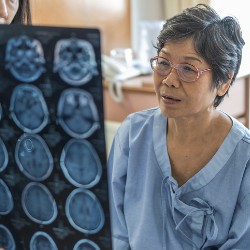'Tell how you are planning your future' for KL2 award
Robert Holloway, M.D, Moffers this advice to young faculty members applying for a KL2 award:Tell a narrative about your research to date — and where you want to go with it in the future.
"That sequence — making sense of your development as a researcher — is critical. You want it to read naturally; a story about how you are planning your future."
The KL2 Mentored Career Development Program provides awards of $75,000 a year for two years to help young faculty members refine their skills, define their goals, and compete for their own research funding. Two to three KL2 awards are made each year.
A new emphasis this year is on an individualized curriculum, Holloway says. New advanced certificate programs — shorter versions of a full master's program — consist of 4 to 5 courses in such subjects as clinical research methods, health services research, and biomedical data science.
Though KL2 scholars can pursue their own area of mentored research, the program has identified three key areas that build on University research strengths and promote the CTSI goal of making translational research faster and more effective. The three areas are:
1. Enabling technologies, for example applications that can monitor patients from distant locations.
2. Regulatory science, including research on the safety and effectiveness of FDA approved products.
3. The electronic health record as a resource for research.
The CTSI has identified mentors, courses, conferences, and external partners for scholars who choose to pursue research in the three areas. Recipients will also be encouraged to participate in a new, twice monthly series of CTSI research methods forums in which young faculty can discuss their research ideas and get feedback.
"The goal of the KL2 is to get to the next funding level, whether it be a K or R series award," Holloway says.
In the 10-year history of the award here, 31 of 125 applications have been funded. More than half of the recipients have been women; 13 percent have been underrepresented minorities, Holloway says.
The 31 recipients have since produced 400 peer-reviewed papers and obtained more than $21 million in external funding. "It's been a very successful program," Holloway says.
Most of the applicants and recipients are from the School of Medicine and Dentistry. "We encourage and would like to see more applications from the Eastman School of Dentistry and the School of Nursing," Holloway says. Only one applicant has been from the River Campus. "Certainly, with the overlapping research interest in promoting interdisciplinary work, we would like to see more applicants from the River Campus as well."
How to apply:
Click here to read the full RFA. Email Katie Libby by 5 p.m. Monday, Oct. 10, 2016, if you intend to apply. Full applications are due on Friday, Nov. 11.This article was authored by Bob Marcotte and originally appeared in the September 16 issue of Research Connections, a weekly e-newsletter for all faculty, scientists, post docs and graduate students engaged in research at the University of Rochester. Click here to read the full issue.
Michael Hazard | 9/16/2016



